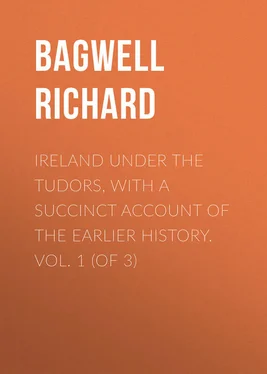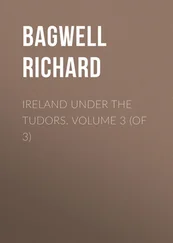Richard Bagwell - Ireland under the Tudors, with a Succinct Account of the Earlier History. Vol. 1 (of 3)
Здесь есть возможность читать онлайн «Richard Bagwell - Ireland under the Tudors, with a Succinct Account of the Earlier History. Vol. 1 (of 3)» — ознакомительный отрывок электронной книги совершенно бесплатно, а после прочтения отрывка купить полную версию. В некоторых случаях можно слушать аудио, скачать через торрент в формате fb2 и присутствует краткое содержание. Жанр: foreign_antique, foreign_prose, Историческая проза, на английском языке. Описание произведения, (предисловие) а так же отзывы посетителей доступны на портале библиотеки ЛибКат.
- Название:Ireland under the Tudors, with a Succinct Account of the Earlier History. Vol. 1 (of 3)
- Автор:
- Жанр:
- Год:неизвестен
- ISBN:нет данных
- Рейтинг книги:4 / 5. Голосов: 1
-
Избранное:Добавить в избранное
- Отзывы:
-
Ваша оценка:
- 80
- 1
- 2
- 3
- 4
- 5
Ireland under the Tudors, with a Succinct Account of the Earlier History. Vol. 1 (of 3): краткое содержание, описание и аннотация
Предлагаем к чтению аннотацию, описание, краткое содержание или предисловие (зависит от того, что написал сам автор книги «Ireland under the Tudors, with a Succinct Account of the Earlier History. Vol. 1 (of 3)»). Если вы не нашли необходимую информацию о книге — напишите в комментариях, мы постараемся отыскать её.
Ireland under the Tudors, with a Succinct Account of the Earlier History. Vol. 1 (of 3) — читать онлайн ознакомительный отрывок
Ниже представлен текст книги, разбитый по страницам. Система сохранения места последней прочитанной страницы, позволяет с удобством читать онлайн бесплатно книгу «Ireland under the Tudors, with a Succinct Account of the Earlier History. Vol. 1 (of 3)», без необходимости каждый раз заново искать на чём Вы остановились. Поставьте закладку, и сможете в любой момент перейти на страницу, на которой закончили чтение.
Интервал:
Закладка:
John’s imperfect partition of Ireland into shires was still more imperfectly carried out. At the death of Edward I. four out of his grandfather’s twelve counties – namely, Meath, Wexford, Carlow, and Kilkenny – were liberties or exempt jurisdictions in the hands of what Davies calls ‘absolute palatines,’ claiming and exercising almost every attribute of sovereignty. The Fitzgeralds had acquired similar authority over a portion of Desmond, and the De Clares over a portion of Thomond. Connaught and Ulster were under the De Burghs, in so far as they had been reduced at all, and Roscommon was a royal castle and the head of a separate county. At Randon on Lough Ree was another royal castle, and these were almost the only strongholds of the Crown in Connaught; for Galway was quite subject to the De Burghs. Within their palatinate jurisdictions, the great nobles made barons and knights, appointed sheriffs, and executed justice. The King’s writ only ran in the Church lands, and was executed by a separate sheriff. So complete was the distinction, that in the mediæval parliaments knights were separately returned for the counties and for the ‘crosses,’ as the ecclesiastical jurisdictions were called. The inherent weakness of such a polity was probably aggravated by the suppression of the Templars, who always kept a strong armed force. In 1308 Edward II. called for an account of their lands and revenues, and the barons of the exchequer answered that they could make no proper inquisition. ‘On account,’ they wrote, ‘of the long distances, and of the feuds between certain of the magnates of Ireland, we do not dare to visit the places named, and jurors of the country cannot come to us for the same reason.’
Dissensions among the barons, caused by the weakness and absence of the Crown, were one great cause of the decline of the colony. Another was the policy of Edward I., which left him little time to attend to Ireland, and tempted him constantly to draw supplies of men from thence. A third was the battle of Bannockburn, which allowed victorious Scotland to compete with England for the dominion of the neighbouring island; and the Irish themselves were not slow to adopt the principle that England’s difficulty is Ireland’s opportunity. In 1315 Edward Bruce landed near Larne with 6,000 men, including some of the best knights in Scotland. Having been joined by O’Neill and the chiefs depending on him, Bruce twice defeated the Red Earl of Ulster, occupied the strongholds of Down and Antrim, and wintered in Westmeath. In the spring he overthrew the Viceroy, Sir Edmund Butler, at Ardscull, for the Earl of Ulster disdained to serve under the King’s representative, and the English armies were therefore beaten in detail. Bruce gained another battle at Kells, wasted all northern Leinster, and then returned to Carrickfergus, where he was joined by King Robert with reinforcements. The Scots went almost where they liked, and Robert Bruce is said to have heard mass at Limerick on Palm Sunday, 1317. They did not cross the Shannon, and seem not to have gone further south than Cashel. Dublin was not attacked, though the invaders came as near as Castleknock. On Easter Thursday, 1317, Roger Mortimer landed at Youghal with 15,000 men and full viceregal powers, and the Bruces retired before him into Ulster. They had devastated the country, and lost many men from the famine which they themselves had caused.
The Bruces were descended from Strongbow and from Dermod MacMurrough, and Robert’s wife was descended from Roderic O’Connor. The true principles of hereditary succession were not fully accepted, and they might pretend some right to interfere in Ireland. They had been invited by the De Lacies of Meath, who for want of male heirs saw their territory divided between De Verdon and De Mortimer. In the first flush of his victorious advance from the south, Roger Mortimer called the De Lacies before him. They refused to appear, and were proclaimed traitors, but continued to adhere to Edward Bruce’s fortunes. The invader, after his brother’s departure, remained for more than a year at Carrickfergus, in hopes of being able to take the offensive again, and still retaining the title of King, which he had assumed after his first successes. He had been so often victorious in battle that he despised the colonists, and, against the advice of his Irish allies, resolved to fight once more without waiting for reinforcements from Scotland. John de Bermingham, at the head of an army which greatly outnumbered the Scots, forced an engagement between Faughard and Dundalk, and Bruce and most of his officers were killed. The remnant of his army, with Walter and Hugo de Lacy, managed to escape to Scotland. The sovereignty of the English Crown in Ireland was never again seriously disputed; but the feudal organisation was shattered by Bruce’s invasion, which did nothing to compose the differences already existing among the colonists. John de Bermingham received a grant of Louth with the title of earl, but his great services were soon forgotten, and eleven years after the battle of Dundalk he was murdered by the English of his own earldom.
English and Irish are agreed as to the cruelty and ferocity of the Bruces. Clyn the Franciscan records, in terse and vigorous Latin, that ‘Robert Bruce, who bore himself as King of the Scots, crossed Ireland from Ulster, where he landed, almost to Limerick, burning, killing, plundering, and spoiling towns, castles, and even churches, both going and returning.’ Clyn was an English partisan, but the same cannot be said of the Lough Cé annalists, who record that ‘Edward Bruce, the destroyer of all Erin in general, both foreigners and Gaels, was slain by the foreigners of Erin, through the power of battle and bravery at Dundalk; and MacRory, King of the Hebrides, and MacDonnell, King of Argyll, together with the men of Scotland, were slain there along with him; and no better deed for the men of all Erin was performed since the beginning of the world, since the Formorian race was expelled from Erin, than this deed; for theft, and famine, and destruction of men occurred throughout Erin during his time for the space of three years and a half; and people used to eat one another, without doubt, throughout Erin.’
There can, however, be no doubt that Edward Bruce came to Ireland on the invitation of the Irish. Donnell O’Neill, claiming to be the true heir to the chief kingship, and the other chiefs, in the famous remonstrance which they addressed to John XXII., informed that Pope that they felt helpless for want of a leader, but were determined no longer to submit like women to Anglo-Norman oppression, and that they had therefore invited over ‘the brother of the most illustrious Lord Robert, by the grace of God King of the Scots, and a descendant of the most noble of their own ancestors,’ and that they had by letters patent constituted him king and lord. The blood of Roderic O’Connor and of Eva evidently went for something, but the chiefs also believed that Edward Bruce was ‘a person of piety and prudence, of a chaste and modest disposition, of great sobriety, and altogether orderly and unassuming in his demeanour.’ Scottish historians are not entirely of the same opinion. It is indeed probable that Bruce had no other idea than to carve out a kingdom with his sword, like a genuine Norman as he was. He had the memory of Earl Richard, of Fitz-Stephen, and of De Courcy to guide him; and if a more modern instance was required, there could be none better than that of his brother Robert.
Читать дальшеИнтервал:
Закладка:
Похожие книги на «Ireland under the Tudors, with a Succinct Account of the Earlier History. Vol. 1 (of 3)»
Представляем Вашему вниманию похожие книги на «Ireland under the Tudors, with a Succinct Account of the Earlier History. Vol. 1 (of 3)» списком для выбора. Мы отобрали схожую по названию и смыслу литературу в надежде предоставить читателям больше вариантов отыскать новые, интересные, ещё непрочитанные произведения.
Обсуждение, отзывы о книге «Ireland under the Tudors, with a Succinct Account of the Earlier History. Vol. 1 (of 3)» и просто собственные мнения читателей. Оставьте ваши комментарии, напишите, что Вы думаете о произведении, его смысле или главных героях. Укажите что конкретно понравилось, а что нет, и почему Вы так считаете.












